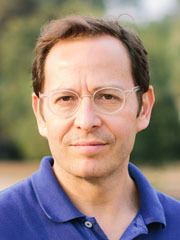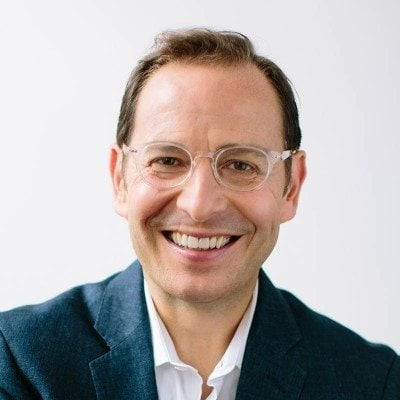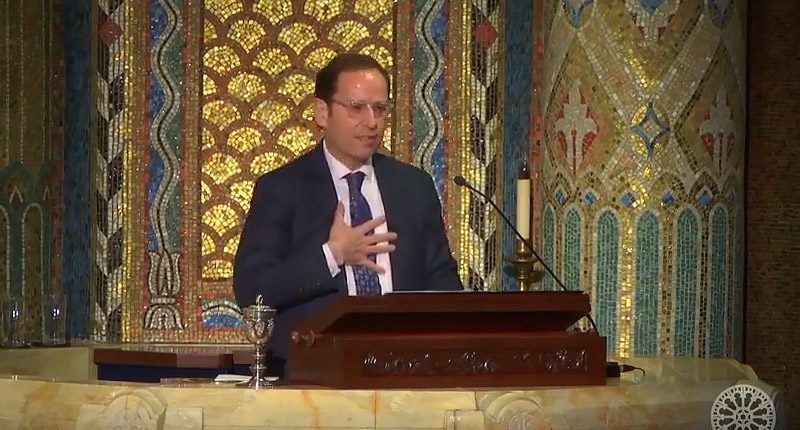In preparing for the High Holidays, I was rereading the late Rabbi Alan Lew’s book, This is Real and You Are Completely Unprepared: The Days of Awe as a Journey of Transformation, and was struck by how Rabbi Lew captured the effect of the shofar’s blast:
“Suddenly you are awakened by a strange noise, a noise that fills the full field of your consciousness and… You awake to confusion. Where are you? Who are you?”
The sound of the shofar—the ancient alarm—rouses us from indifference, moves us to action, and renews our conviction to keep going despite seemingly insurmountable challenges. The High Holidays fall between the most mournful day of the Jewish year, Tisha B’Av, and the most joyful, Simchat Torah. In between, the shofar is the catalyst that allows us to rise from mourning the persecution of our people to celebrating the giving of the Torah. The shofar inspires us to rise above despair and embrace the promise of a better world.
And we are in desperate need of this call to action. People in our own country and across the globe are experiencing massive assaults on democracy, decency and rule of law. Millions in Uganda, South Sudan and Kenya suffer from malnutrition, as the East African drought burns through another year. And over 700,000 Rohingya refugees living in camps in Bangladesh remain rootless, their homes just over the border in Burma unreachable.
I hear in AJWS’s work and the work of our grantees around the world the voice of the shofar, calling for justice even in the most desperate corners of humanity.
Last February, I traveled to the state of Karnataka in Southern India. There I met young Indian women and men working to confront the gender inequality and sexual violence so prevalent in Indian society. I was inspired by a group of young men who were participating in trainings run by AJWS grantee Samvada, which sought to expose them to new ideas about equity and justice and the role they had to play in changing the views of others. As one man, Nandan (whom I wrote about previously here) told me: “Before I came to Samvada, I perceived women as inferior to men… Hindus were superior to Muslims… people are poor because they don’t work hard.” Nandan had even begun mentoring other young men and was active in local campaigns to stop sexual harassment on the streets of his small town. I heard the sound of the shofar in his courageous transformation.
In Kenya, human rights attorney Christine Knonge and her colleagues at the AJWS grantee legal justice organization Katiba Institute issued a powerful call to stop destruction of Kenya’s environment and the displacement of some of its poorest people. In 2012, the Kenyan government launched a major construction project, including oil refineries and a coal plant, that threatened the country’s rich natural resources and the lives and livelihoods of thousands of Kenyan fishermen and women, farmers and herders. After six years of tireless advocacy, Christine and her colleagues landed a critical victory—the country’s High Court ordered the government to pay local communities millions in damages. I heard the blast of the shofar reverberating loudly there as the Kenyan court awoke to the damage being done in the name of development and decreed it must be stopped.
Rohingya activist Tun Khin has devoted his life to sounding the call for justice. As president and co-founder of the Burmese Rohingya Organisation UK (BROUK), an AJWS grantee, Tun Khin is one of the most tireless advocates today bringing global attention to the ongoing refugee crisis of his people. Exiled from his homeland, he has spoken before the British Parliament, the U.S. Congress and State Department, and the United Nations to pressure governments to act before more lives are lost. Last fall, Tun Khin traveled to Bangladesh to provide food and medication to the most vulnerable Rohingya refuges there and collect their stories—stories of people chased from their homes, of villages burned, of women raped, of babies murdered—to bring back with him, to alert the world.
These stories called out to me—raw and resounding as the deepest cry from a ram’s horn—echoing the cries of the murdered and displaced. How can we not think of our own ancestors who were persecuted, driven from their homes and extinguished? The cries of the Rohingya and the echoes of our history implore us to do all in our power to stop these atrocities.
Working alongside courageous activists like Tun Khin, Christine, and Nandan this year was, indeed, as powerful a call to action as that very first shofar blast we hear on Rosh Hashanah each year.
With the final chapter of 5778 ending and the first page of 5779 yet to be written, I’m reminded of poet Adrienne Rich’s poem, “Dreams Before Waking”:
What would it mean to live
in a city whose people were changing
each other’s despair into hope?—
You yourself must change it…
what would it mean to stand on the first
page to the end of despair?
This High Holiday season, may the piercing sound of the shofar awaken us to injustice and enable each of us to change the despair of our world into profound hope. From India to Kenya, Burma and beyond, may all of our names be written in the Book of Life so we can march on, renewed, to stand on that first page together.

Robert Bank is President and CEO of American Jewish World Service, the leading Jewish organization working to promote human rights in the developing world. Robert has spent his career championing human rights as an attorney, activist and leader. He joined AJWS as Executive Vice President in 2009 and previously served in New York’s municipal government and in the leadership of GMHC—one of the world’s leading organizations combatting HIV/AIDS. Robert has been honored with GMHC’s Lifetime Achievement Award and the Partners in Justice Award from AVODAH: The Jewish Service Corps.






